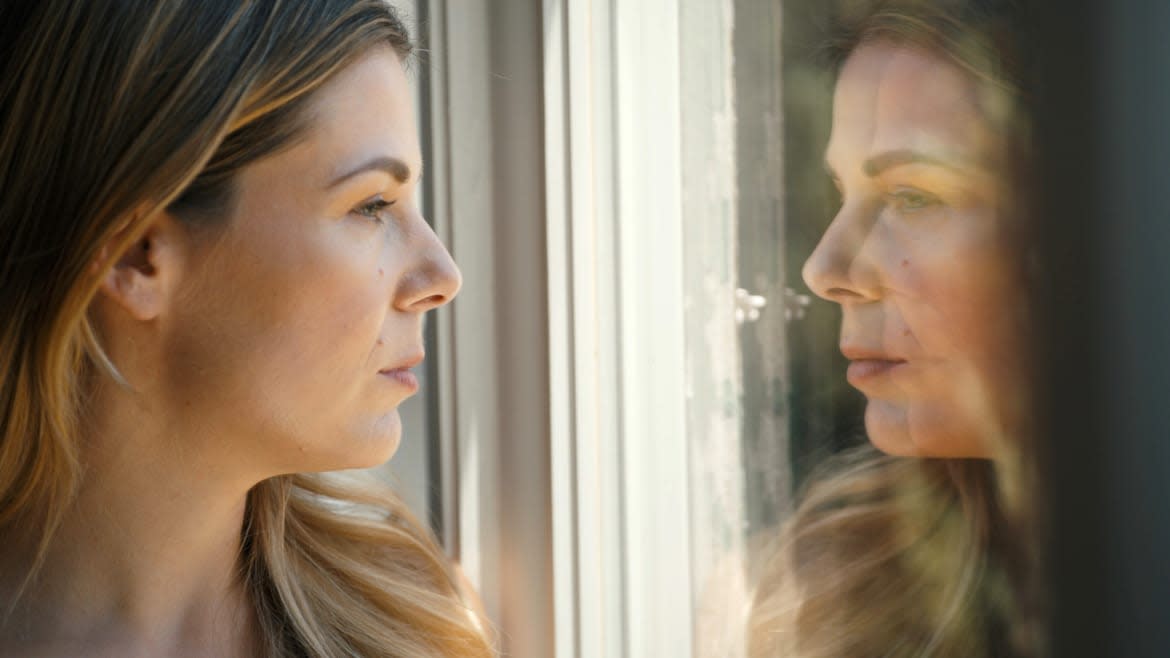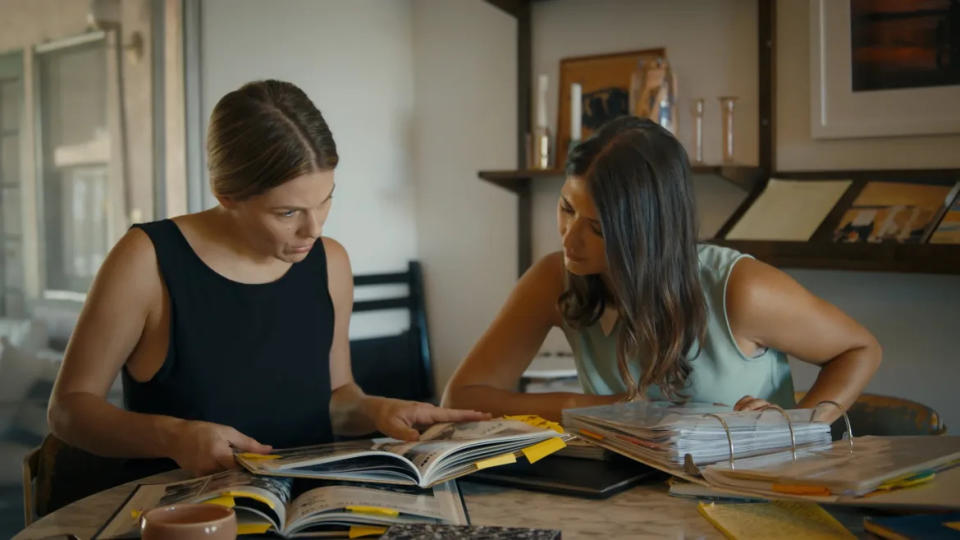‘Keep This Between Us’ Exposes the Grooming Epidemic in America’s Schools

When the harrowing revelations about Harvey Weinstein first broke in 2017, Cheryl Nichols—executive producer and subject of the Freeform docuseries Keep This Between Us—remembers reading the coverage in her living room. “The first thing I thought of,” she recently told The Daily Beast, “was what happened to me.”
As described in the docuseries, Nichols grew up in a small town in Texas called Little Elm. She alleges that her high school theater teacher’s husband groomed her as a teen—a relationship that continued into her college years. While Nichols knows that her experience as a survivor of grooming and sexual abuse is not identical to those of Weinstein’s accusers, the national news story did strike her “as part of this bigger problem of misogyny and patriarchy and abuse of power.” Seeing Weinstein’s accusers come forward prompted the filmmaker to start thinking about how she wanted to tell her own story.
Part personal narrative and part cultural exploration, Keep This Between Us examines grooming and sexual abuse in the American school system. The series combines expert interviews, first-person accounts, and social media testimony. In addition to Nichols, the series’ second subject is a young survivor named Heaven Rubin—who brought the Miami-Dade School Board to court for its response to her own allegedly inappropriate relationship with a teacher when she was 17.
The docuseries premieres its first two installments Aug. 29 on Freeform. The latter two will follow on Aug. 30, and all episodes will be available on Hulu 24 hours after they air. During a recent interview, Nichols explained how her idea for a feature-length documentary morphed into something bigger.
Their Husbands Were Pedophiles. So They Took Their Kids and Disappeared.
“The more people we spoke to, the more it became obvious that this was a huge problem and deserved more time than just an hour,” Nichols said. And so, the film became a four-part docuseries directed by Amy Berg (Phoenix Rising), Jenna Rosher (Dear…) and Kristi Jacobson (Solitary). Nichols executive-produced.
“I wanted to make sure that as many eyes got on this as possible,” Nichols said. “And I wanted to tell a story from my intimate perspective, because I felt like if I was able to be vulnerable and be open, that would allow other women to relate to me in a way.”
The series finds Nichols interviewing former classmates, one of her high school teachers, and a best friend whom she pushed away as her allegedly inappropriate relationship with her theater teacher’s husband grew more intense. The project also helped Nichols realize the degree to which every trauma survivor’s journey is different. At first, she recalled, she dedicated most of her focus to getting other women to come forward and speak about their experiences. Over time, however, she realized that needn’t always be the case.
“Some people don’t need to come forward in order to process [something like] this,” Nichols said. Realizing that, she added, “was kind of one of the biggest shifts and changes for me—and my ass was definitely handed to me on that a lot.”
In place of group testimony, the emotional power in Keep This Between Us emerges when Nichols takes a seat on the other side of the figurative table.
In order to achieve the vulnerability Nichols wanted, she knew she needed to leave her comfort zone and “step into the subject role.” As one might imagine, that’s no easy task for someone whose adult coping mechanisms tend to revolve around control.
“I had no idea how to anticipate how I was going to react emotionally,” Nichols said. “The real lows I would go through; what would actually bring me joy in this process.”
The filmmaker was determined to truly let go, even if predicting what that might mean was pretty much impossible. Still, Nichols also knew that part of what motivated her was a desire to own her narrative of what happened between herself and her teacher—which, in certain moments, certainly made letting go even harder.
Keep This Between Us took almost five years to make. “So from beginning to end [of the project], it’s like I’m a completely different person,” Nichols observed.
Some of that evolution takes place on screen. Among the most interesting interviews Nichols conducts are those with her old Spanish teacher, who used to call her alleged groomer a friend. Before the close of the final episode, Nichols finds herself asking the Spanish teacher about allegations made against him.
“The dynamic between he and I definitely shifted over the course of making this documentary,” Nichols said. “I had a lot of realizations about the reasons and the ways that I choose to be loyal to friendships—especially friendships with older men, and especially friendships with older teachers.”
The producer’s developing perspective is not the only shift in focus. Halfway through Keep This Between Us, we meet Heaven, who last year won $6 million in damages in her sexual-abuse case against the Miami-Dade school board stemming from allegations against former high school teacher Jason Meyers. (Heaven alleges that Meyers, her English teacher, abused her when she was 17. Although the State of Florida has brought criminal charges against Meyers, he has not been found guilty and denies all allegations.) As Nichols observes in the docuseries, survivors’ paths toward healing can vary; while she processes her trauma through the production, Heaven has sought catharsis in court.
Before she began work on Keep This Between Us, Nichols hadn’t met that many fellow survivors. Making those connections, she said, has deepened her understanding of her own experience. She recalled a conversation she’d shared with fellow grooming survivor and Being Lolita author Alisson Wood that changed her perspective on labels like “victim” and “survivor.”

“I hated those words,” Nichols said. “I felt like they didn’t describe my experience or who I was. But throughout this process, I really started to relate to the word ‘victim’ in a way that didn’t feel belittling... Allison spoke about the word in a way that made so much sense to me as something that has happened to you and not something that you are. And I love that.”
Victim-blaming and minimization of abusive damage, as Keep This Between Us points out, are embedded within rape culture. During her own testimony, Heaven details how the School Board attempted to downplay what happened to her. To Nichols, the most damaging narrative Americans carry about teenage girls usually comes down to six words: “She knew what she was doing.”
“I think a lot of times we believe that teenage girls are young women. We don’t think of them as children, which is what they are,” Nichols said. “Growing up, all I heard was, ‘You’re so mature. You’re wise beyond your years.’ Though that might have been true, there were people who used that as a justification to take what they wanted from me and to treat me the way that they wanted to.”
Get the Daily Beast's biggest scoops and scandals delivered right to your inbox. Sign up now.
Stay informed and gain unlimited access to the Daily Beast's unmatched reporting. Subscribe now.

